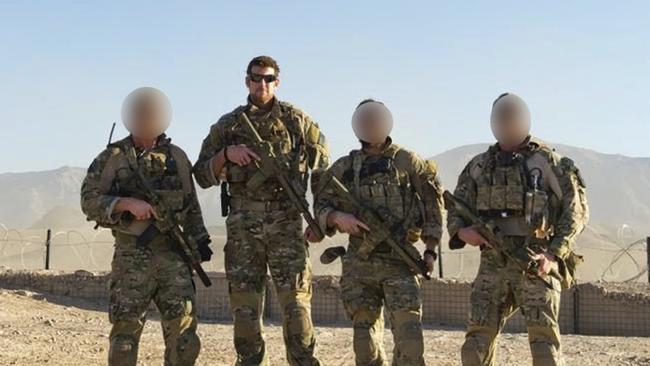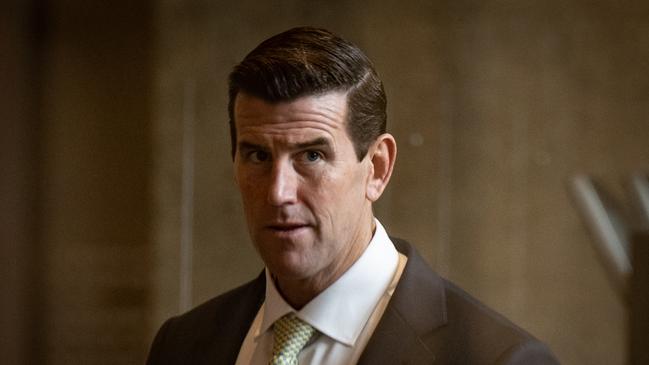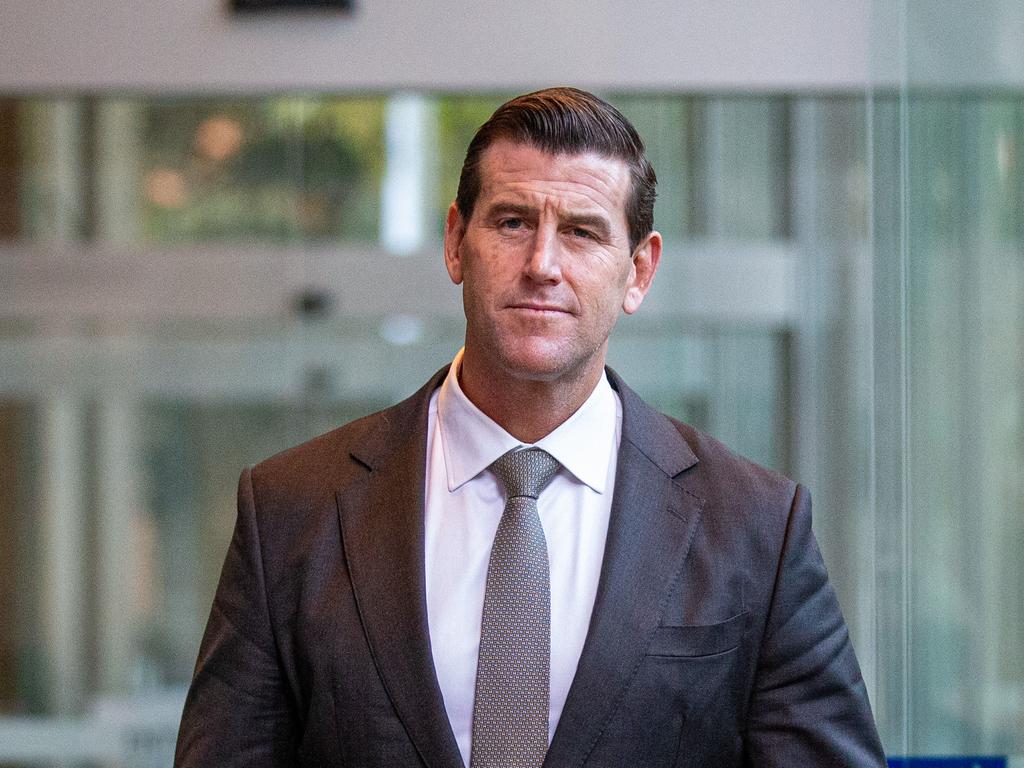‘Betrayal’ tore blood brothers apart, fuelled $25m lawsuit
Ben Roberts-Smith once asked his great mate to be the best man at his wedding, now he is defending allegations from his former friend that he is a murderer.

They were the greatest of mates, two SAS soldiers whose friendship had been forged under fire in Afghanistan.
One had asked the other to be the best man at his wedding. Now his best man was accusing him of murder. Of shooting a handcuffed prisoner in cold blood.
Like all SAS witnesses who appeared at the Ben Roberts-Smith defamation trial, the accused man’s identity was protected when he was called to give evidence.
But his voice revealed bewilderment rather than anger at his mate’s betrayal.
“I felt incredibly hurt by that,” he said simply. “That someone so close for a number of years – a mentor, a good friend not just professionally but personally – would have said such things that caused me so much grief and heartache.”
Lifelong friendships have been shredded in the fallout of Roberts-Smith’s high-stakes defamation action over allegations of war crimes, a history-making clash that has already cost at least $25m.
Roberts-Smith has always vehemently denied wrongdoing and has never been charged with any offence.

On Thursday Justice Anthony Besanko will hand down a decision that will either restore the war hero’s battered reputation or leave him a pariah, unfit to wear his cherished Victoria Cross.
For Nine, Besanko’s ruling will mean either a crushing blow to its journalists – and its bottom line – or vindication of its five-year pursuit of the story. But nothing in his judgment will repair the broken bonds among dozens of former comrades in arms, caught up in a legal battle not of their choosing.
The reputation of the SAS had already been trashed by the Brereton inquiry’s finding in November 2020 of evidence that special forces soldiers committed 39 murders in Afghanistan and covered them up by maintaining a band-of-brothers code of silence.
That code frayed as war crimes investigators explored – and exploited – the deep personal animosities that had split Australia’s premier fighting force into two warring camps for more than a decade, with hatred of – or loyalty to – Roberts-Smith often at the core of those divisions.
Many of those being questioned by authorities about their knowledge of war crimes were also being subpoenaed to appear in the defamation case. Most did so unwillingly, some in tears.
One soldier who gave devastating evidence against Roberts-Smith, saying he saw the soldier machine gun a prisoner, became emotional as he made clear his high personal regard for his former friend.
“I still don’t agree with the fact BRS is here, under extreme duress, for killing bad dudes we went over there to kill,” he said. “I do not want to be here. I find it extremely difficult to stomach having to give evidence against that man (Roberts-Smith) in the corner.”

Few witnesses felt the pain of a friendship torn apart more acutely than the two men known in court as Person 4 and Person 11. They were the only witnesses to what occurred after Roberts-Smith allegedly kicked handcuffed shepherd Ali Jan off a cliff at Darwan in 2012, the centrepiece allegation in the Nine newspapers’ stories. Roberts-Smith and his squad were hunting for turncoat Afghan army sergeant Hekmatullah who had recently killed three Australian soldiers as they played cards in the Australian base.
Late in the mission – just before the soldiers were due to be extracted – Ali Jan was detained and interrogated by Roberts-Smith, the newspapers reporter. Another Afghan detained that day testified that when “the big soldier” said something to Ali Jan, the farmer made the mistake of smiling.
Person 4 gave evidence at the trial that Roberts-Smith took a few steps forward and kicked the man in the chest, sending him sailing over the edge. Person 4, who at the time was Roberts-Smith’s second in command, gave graphic evidence of watching the farmer tumble down the rocky incline and into the dry creek below, shattering his teeth on a rock on the way down. The soldier said he and Person 11 then dragged the man across the dry creek bed.
As he walked away, Person 4 testified, he heard gunshots ring out. When he turned, he saw Person 11 with his weapon raised and Roberts-Smith watching on. Roberts-Smith says the cliff incident simply did not happen. Instead, he and Person 11 each recounted how they had engaged and killed a Taliban “spotter” carrying a radio after they had crossed the dry creek bed, as the team was making its way to an extraction point, to be picked up by helicopters,
Person 11 said he saw a man in the cornfields about 20m away “moving in a very suspicious manner”. He fired a burst of three or four rounds at the man with his M4 assault rifle, and realised Roberts-Smith, behind him, was also shooting at the man.
The two versions of what occurred could not have been more different; someone was lying.
Person 4 was probably Nine’s most important eyewitness in the case and gave compelling testimony on behalf of the newspapers.
But his credibility was tested.

Person 4 struggled with his mental health for years after his tours in Afghanistan and was discharged from the Australian Defence Force. It was his stories of atrocities that first began to filter through the regiment and ultimately to Nine’s journalists. The soldier had fought courageously alongside Roberts-Smith at the ferocious battle of Tizak, for which Roberts-Smith was awarded his Victoria Cross. While Person 4 was awarded the Medal of Gallantry for his actions at Tizak, he admitted it rankled that Roberts-Smith received the VC.
On the witness stand, he admitted he had been manipulated by other soldiers who had eventually gone to the media with their claims about Roberts-Smith.
But Person 4 remained unapologetic about his evidence against his former friend, Person 11.
Person 11 confirmed that, after suffering a near mental breakdown, he had called Person 4.
“It was brief, but I laid out I was hurt deeply, disappointed, and that I was aware of what was going on and from this time forward our personal relationship was over,” he said.
They haven’t spoken in five years.







